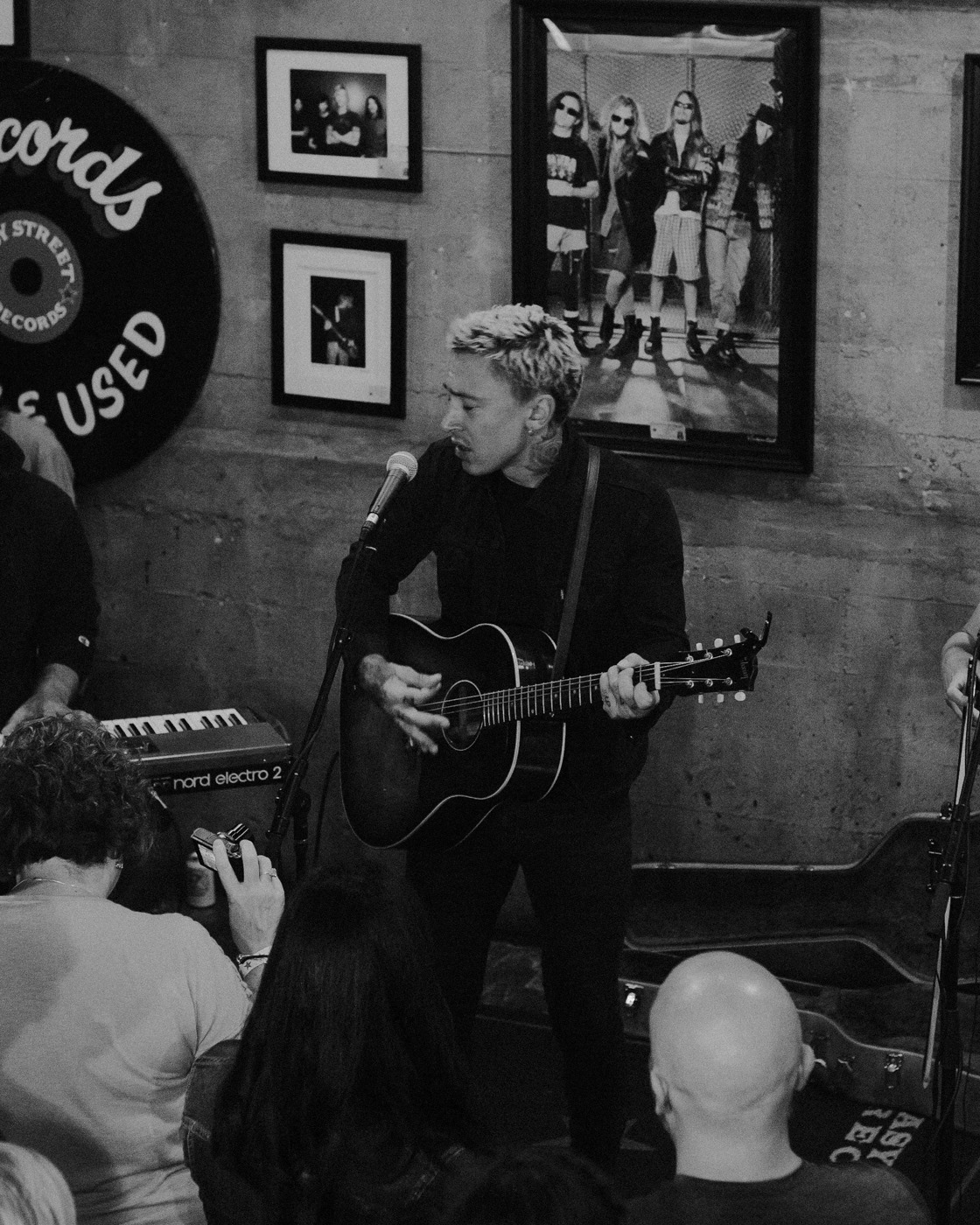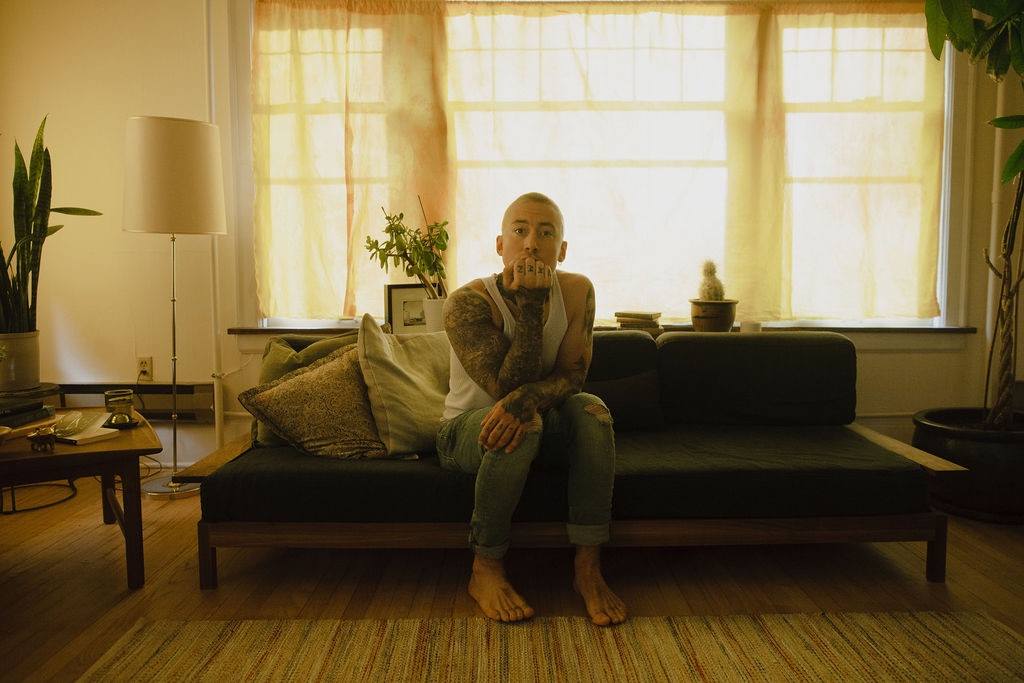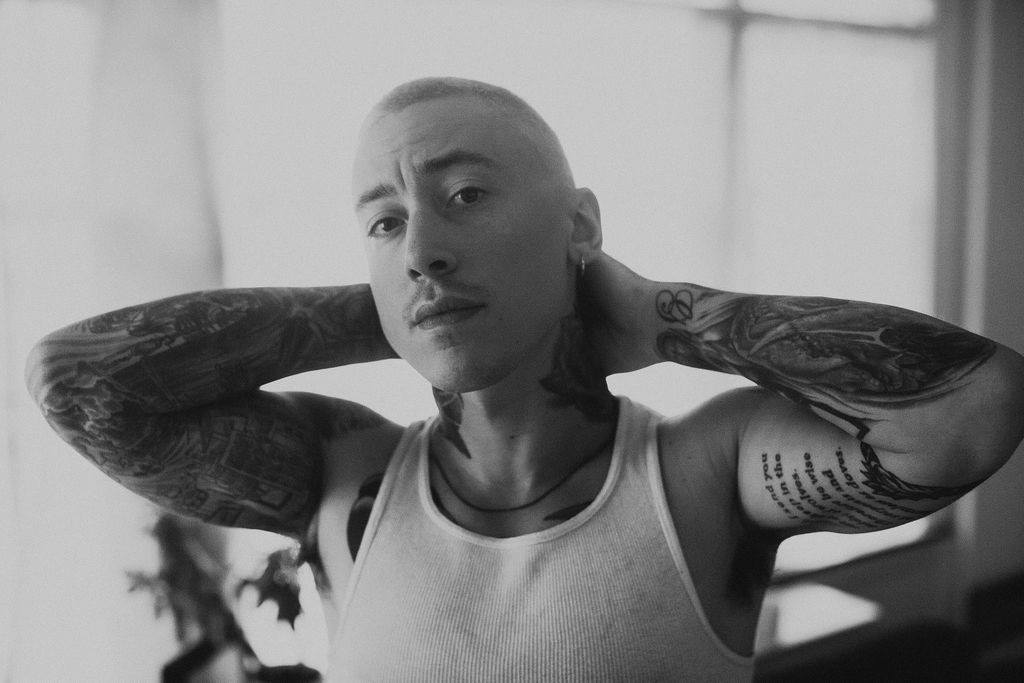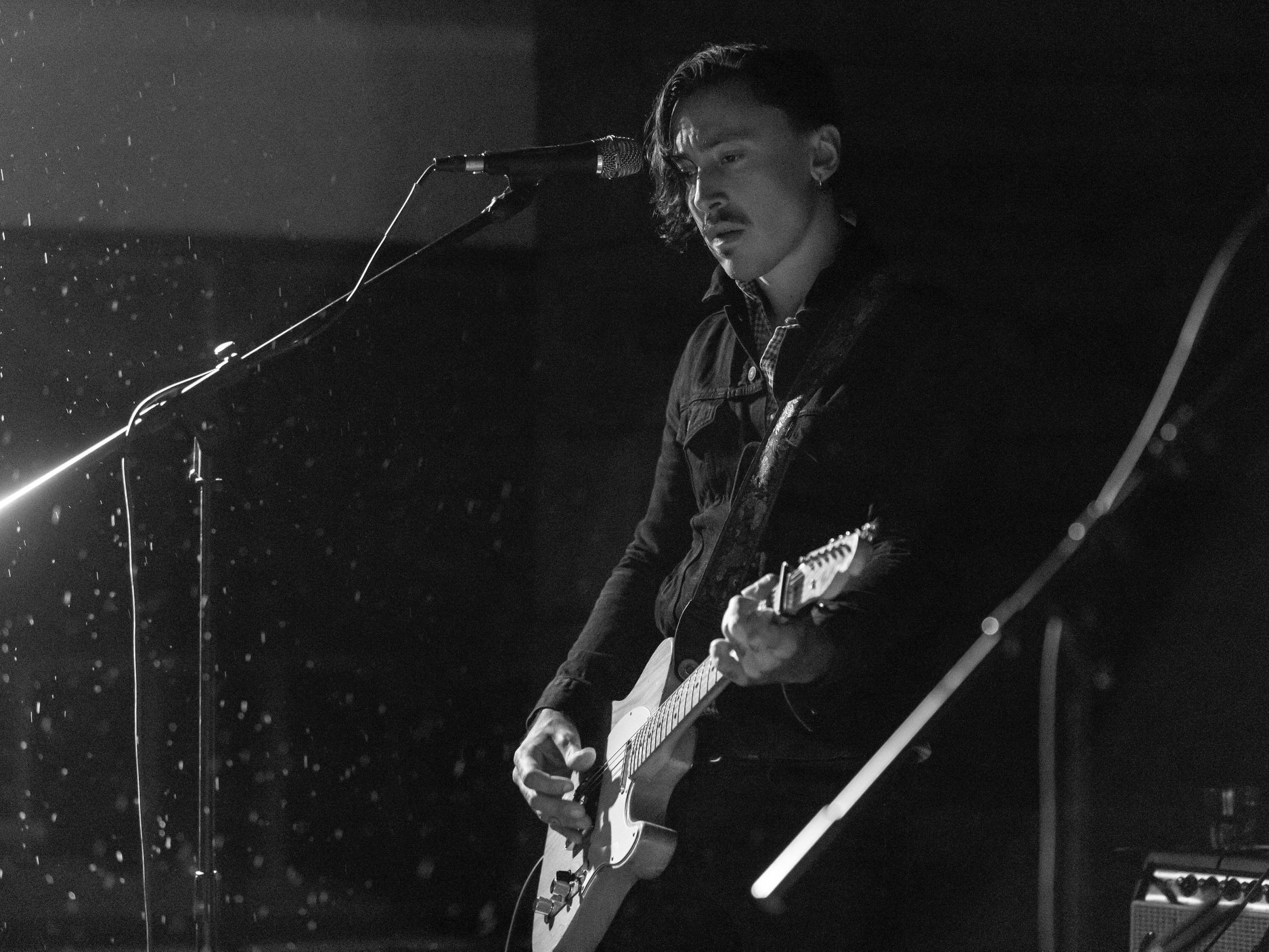After more than a decade as a musician, Noah Gundersen is finally coming into his own. Since releasing his debut album as a teenager, Gundersen has made a name for himself as an honest singer-songwriter and developed a devoted following of fans. Though Gundersen has always written songs through the lens of his own perspective, the release of his latest album, Lover, polishes that lens and gives listeners the clearest vision of Gundersen’s perspective we’ve yet to experience.
Following the August release of the album, Gundersen is taking his vulnerability to the stage for his current tour — and will make a stop in Denver this week. We got a chance to talk with the singer-songwriter about his journey to self-acceptance ahead of his Denver appearance.
303 Magazine: I know the tour just started a few days ago, but how is it going so far?
Noah Gundersen: It’s good. We just started a few days ago in Bellingham [WA.] and we had a couple of days off, which was nice because I kind of — there’s a lot more singing in this show than I was ready for. So, I kinda blew my voice out, but I’m feeling a lot better now. We’re in Boise today, and it’s great. It’s a really good crew, a good band, everybody has a really great attitude and has been staying relatively healthy.
303: That all sounds good. I want to start off by asking you about a show you played here in Denver right before the album release in August. You played a show at Bellwether, is that right?
NH: Yeah! So, we had been doing these little listening parties for the album, and we were doing one in Seattle and I had posted about it. My friend Josh, who runs Bellwether, was like “you should do one here.” So I jokingly was like that’s in like two days, but if you fly me out then sure and he said, “okay, I’m buying you a ticket.” So then it was like, shit I guess I have to do that. But it was great. It was super fun. That whole crew down there are good friends of mine, so it was a really fun excuse to just come hang out in Denver for a night.
303: I saw some photos from that online, it looked like a really great time.
NH: Yeah. It was cool to just hang out too. I played a couple of songs, but mostly I just put on the record and hung out and got to have some beers with people. I got to talk with fans. It’s been nice doing those kinds of events more and just connecting more with the people who listen to my music. I feel like I used to be a little more standoffish, probably just based on my own social anxiety, and now I’m just trying to engage more. It’s been really nice. People have been really supportive, and it’s been really cool to hear different people’s stories and how this music has impacted their life.
303: I think those intimate shows seem appropriate for this record in particular because it feels like your most vulnerable album yet. Does that feel true to you?
NH: Yeah for sure. It’s almost funny to say because I feel like — I don’t know. At least my perception of my own career path has been making a name for myself being the confessional sad, white, singer-songwriter guy who talks about his feelings too much. So it’s kinda funny to say at 30, on my fourth album, is when I finally got truly vulnerable. I think there’s a difference between romanticizing your pain and actually just being honest about your situation, with a sense of grace too. So with this record, I was more intentional about just like — these are my stories, this is what’s going on in my life, these are the experiences that I’ve had, without romanticizing some of the bullshit. Also, telling it with, you know, what I felt like is my own true voice, instead of maybe using certain language that felt more consistent with maybe how I had written in the past. With this one, I feel like I discovered a way to be more true to how I would actually want to communicate these experiences from my perspective.
So yeah, I think it’s definitely the most open and vulnerable, but it’s weirdly also the most fun. I mean, there’s a lot of heavy material on the record but, you know, doing these shows with these songs has been kind of a different experience. There’s more, kind of up moments. It’s not as dark and heavy as some previous tours have been, which is cool. I think some people are not quite sure what to do with themselves — being at a Noah Gundersen show and not just crying the whole time [laughs]. It’s been really cool. It’s a fun, new space to explore.
303: I know you’ve mentioned in some other interviews that this last year has been a transformative time in your life, but is there anything that’s happened that you think was a major contributing factor to your ability to be more open and vulnerable than you have been in the past?
NH: Yeah, there are a few things. I finally started to go to therapy seriously in the last year, and that’s been super helpful. I feel like that’s something that everyone should do at some point in their life. It’s helped me to be more kind to myself and to be closer to my experience and be able to communicate it more honestly because I can see it more clearly. I think also doing psychedelics is really important for the death of your ego. So, I’ve done a lot of mushrooms in the last couple of years and that’s honestly been transformative. It just takes you out of yourself and it’s helped me take myself a little less seriously and to see that everyone is insecure, and everyone is fucked up in their own way. We’re all just trying to figure it out. There’s not this ultimate truth or nirvana that I’m just at some point going to have it all figured out. That’s just a lie. So, it’s helped me to have more grace for the journey. Also, just turning 30 and feeling more comfortable in my own skin. I think all of those things came together to make this record. Also finding a great collaborator. My friend Andy Park, who I made the record with, him and I just have a really great creative relationship that made this record possible.
303: In terms of psilocybin, do you find that having that mind-altering experience has affected your creative process?
NH: You guys just decriminalized it I think, in Colorado?
303: That’s correct.
NH: Yeah, I mean, I think first and foremost it affected just my own personal perspective. My art is a direct reflection of my perspective as an individual, so in that case yeah, it affected my creativity. In certain ways, it helped me be more self-accepting. It also cleared out some of the anxiety and depression I wasn’t even fully aware was there until I got some space away from it. It’s kind of like when you are a heavy smoker, you don’t really realize how shitty you feel until you stop smoking for a month. And then you’re like “oh, wow, this is what it’s like to not be carrying around this weight all the time.” So, in that case, I think the creative process is very much a slow state, and if you get bogged down by all this anxiety and depression where your mind kinda can’t get out of a certain groove then that’s going to hinder your creativity I think. Mushrooms definitely helped me get out of that groove.
There’s an analogy that is used in Michael Poland’s book about mushrooms. I think he’s quoting someone else, but he says that our mind is like a snow-covered hill. If you’re sledding down a snow-covered hill eventually the sled will start to make grooves in the hill and you kind of continue to go down that same path over and over again because the sled will find it’s way back into there. His analogy is that what mushrooms do is they kind of re-powder the hill. It’s not like it fixes anything, but it gives you a chance to make new mental pathways and new ways of thinking.
303: The album seems to do a good job of recognizing some of those anxieties and darker thoughts, but it still feels hopeful. Can you talk to me about being vulnerable with those anxieties in the studio and how that differs from being vulnerable in front of an audience at a live show?
NH: I mean, with the studio there’s so much more time, you know? We kind of took as long as we wanted to to make sure that it felt honest and it felt exciting. A lot of that was just intuition, you know? You just fuck with it until it works. There were no rules, except for I just wanted to be really pumped about it. So, if I was only 90% pumped about it then we weren’t done yet. On the tour, it’s cool because I have such a great team around me that I’m really able to focus on working out all the kinks. I think by the time we get to Denver the show is going to be sick as fuck. Right now, it’s pretty cool, we’re still just figuring out transitions and stuff, but it’s a little more on the mechanic’s side when it comes to the show. I’m also still learning how to settle into the emotional side of the show while still thinking about the technicality of all this. It’s a different space than the studio. I mean, I love being in the studio because it feels like the most creative space. But, it’s also cool to just be able to perform these songs for the fans and see the reactions that people have to them, and kind of see in real time the emotional experience that people get to have with the songs. Maybe what I’m trying to say is that when I’m in the studio they feel more like my songs, and then when I go out to play them I’m kind of releasing my ownership of them out into the world and they dont belong to me in the same way anymore.
303: I know that you’ve mentioned in past interviews that it feels like your fans aren’t connecting with your story but rather with their own story that they see in the music. In speaking with your fans have you discovered anything new within the music that you hadn’t before?
NH: Yeah. I mean, I think my fanbase has been growing up with me, which is – it’s a really cool thing to look out in the crowd and be like, oh, these are my peers. They’re just – I really honestly have the best fans. People are just super nice and very engaged and respectful. It’s also been cool that we’re all kind of growing up together. This is very much a record about the end of your 20s going into your 30s, kind of wrestling with all of that transition and stuff. I see that reflected in the audience. It’s just nice to know that we’re all in this together.
303: I want to circle back a little bit to talk about one specific song on the album in relation to mental health, “Robin Williams,” which I’ve read that you wrote after watching a documentary about Robin Williams.
NH: I get asked about that song a lot. The Robin Williams part is obviously important and it’s the thing that catches people’s attention. But, it’s not really a song about Robin Williams and mental health per se. It’s more about just a handful of musings. I kinda wanted to start off the record with like, this is where I find myself now at 30. These are five verses about, you know, just whatever kind of musings or perspectives that I have at this point in my life. You know, thinking about mortality, thinking about the importance of art and also that it kind of doesn’t matter in the end – it’s not something you get to take with you when you die. That’s not a bad thing, it’s kind of just an important reality. And also maybe, just a friendly ego check to be like, no matter how famous or creative or successful or important you are, you’re going to die. Everyone is. It’s similar to that thing I was saying about doing mushrooms, recognizing that everyone is insecure. It’s so easy to compare ourselves to other people, but in the end everyone is gonna go. So it’s kind of like death is the great equalizer. It’s also just reflections about my career and my pursuit of love and relationships and a bunch of different things. That Robin Williams line is important, but it’s about a bunch of things.
303: I think that song and everything it discusses really serves as a perfect introduction to the rest of the album.
NH: Totally. When we put out a record, I really thought that it seemed like a good table of contents. If the record was a book, that would kind of layout – here are some of the scenes that we’re going to be covering in the next chapters.
303: In keeping with that analogy, if there was a narrative or story arc to the record, what would it be?
NH: It’s hard to say. I think there’s – it’s a little fragmented. I guess the loose theme is going through a certain period of my life where I was partying a lot. I think subconsciously I was just trying to get the most out of the end of my 20’s as possible. I had a lot of fun, there was also some disastrous relationship endings, there was some financial stuff that happened, some health issues – all of those things coming out of this period that made me go “oh fuck.” You start to realize your own mortality a little bit. And then, coming out of some of those darker times into a space of – I don’t know just having more grace for myself, not being so hard on myself, having more grace for other people, you kind of slow down a little bit. Also, just being close to my emotional experience and not just having to bury it. I guess it’s kind of an album about love, failure and acceptance.
303: You mentioned earlier that some of these shows have been a different experience for fans who have followed your career and know you as the sad singer-songerwriter. Is this happy record indicative of a future trend for you?
NH: I have no idea. Hopefully! For my own sanity I hope. I’m also just trying to recognize that there are people coming to these shows that have seen me a lot. I have a pretty cool, dedicated fanbase. So I’m trying to make sure I’m not only playing the new album. There’s a good chunk of the set that’s older songs too, and I’m trying to switch it up every night. I’m just trying to be as aware as possible of the fans. Especially as the fanbase is getting older you know? There are fans who have to get a babysitter to come out, or you know, it’s like a weeknight and they have jobs in the morning and stuff. It’s more of an event. I just want to honor that. I don’t want to take that lightly. People are investing their time and energy and money into coming out to see me play. There’s some almost dancy moments in the set, which is fun and different. It just feels good to end the show and not be like “Woah, I’m like emotionally wrecked.” There’s definitely been some tours where some songs have been so emotionally heavy. There are some emotionally heavy songs on this record, but there’s also moments of joy and self acceptance.
303: You said earlier that you think you’ll be in the groove of these shows by the time you make it to Denver on Friday, can you talk to me about the show?
NH: I’m just excited to be in Denver. I love the Bluebird, that’s one of my favorite venues to tour in. That’s the show that I’m looking forward to – I think we’ll have everything ironed out at that point. And I have a ton of friends in Denver, I’m excited to be there and hangout. We’re doing an after-party at Bellwether for ticket holders, which will be super fun. I’m stoked.
Noah Gundersen will perform at the Bluebird on September 27. Tickets are available here.
There will be an after-party at Bellwether, 5126 E Colfax Ave., following the show for all ticket holders.







